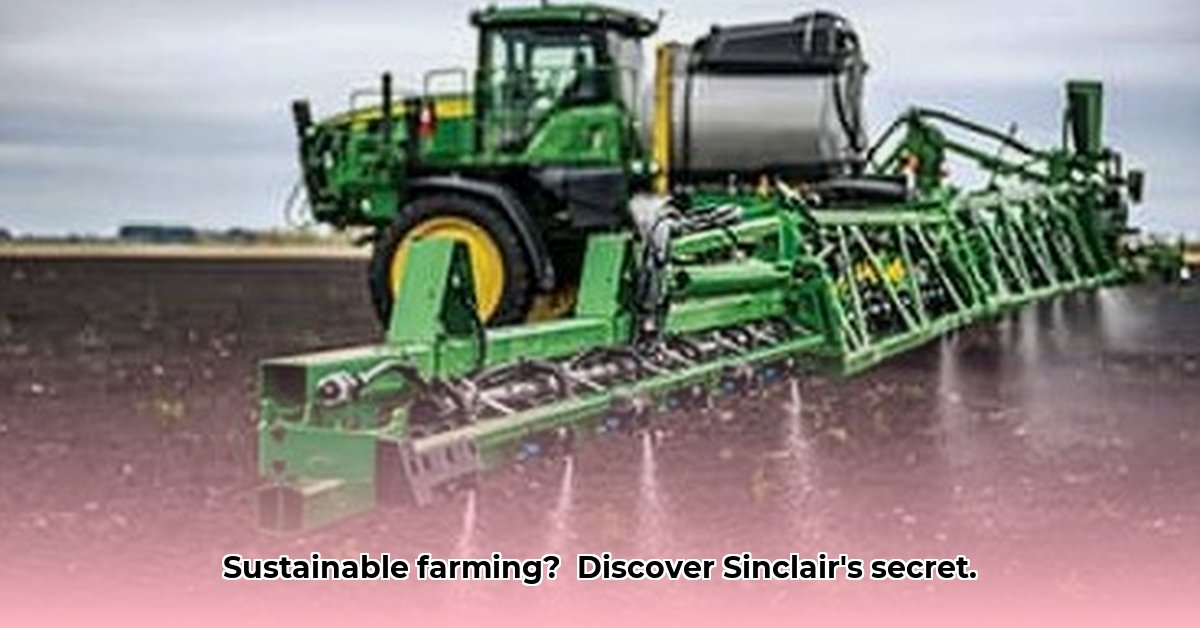
Navigating the Future of Sustainable Agriculture in Southeast Iowa
Sinclair Tractor, with its extensive network of thirteen John Deere dealerships and five NAPA Auto Parts stores across Washington, Iowa, and surrounding areas, is more than just a farm equipment supplier; it's a vital player in the evolving landscape of sustainable agriculture. Their success stems from servicing a diverse clientele, ranging from small-scale farmers to large agricultural operations, landscapers, and construction contractors. This broad reach demonstrates adaptability—a crucial trait in a market increasingly focused on environmentally conscious practices. But how effectively does Sinclair Tractor integrate sustainability into its business model, and what opportunities lie ahead?
For more on sustainable farming equipment, check out this resource.
How can Sinclair Tractor better serve the needs of environmentally conscious farmers? This is a critical question considering the growing market for sustainable agricultural solutions. The company's current marketing materials don't prominently feature sustainability initiatives, which presents a potentially significant missed opportunity for growth. This article explores Sinclair Tractor's current position, identifies challenges and opportunities, and proposes a strategic path towards greater sustainability.
One notable aspect of Sinclair's operation is its substantial inventory of used equipment. While this provides a cost-effective option for farmers, it also raises questions regarding environmental sustainability. The age and fuel efficiency of these used machines are factors that need greater transparency. Does Sinclair provide detailed information about the environmental impact of its used equipment? More comprehensive online descriptions specifying fuel efficiency and remaining lifespan would significantly enhance customer decision-making and build trust.
A Roadmap to Sustainable Success: Key Strategic Steps
Sinclair Tractor can significantly bolster its position in the sustainable agriculture market by proactively implementing several key strategies:
Targeted Market Research: Conduct thorough market research to precisely define the sustainable equipment needs of their customer base. This isn’t conjecture; it involves gathering concrete data through surveys, focus groups, and direct client engagement to understand specific requirements for both equipment and services.
Investing in Staff Expertise: Invest in comprehensive training programs for staff on the latest sustainable agricultural practices and the associated equipment. This will enable them to offer informed guidance to customers and build confidence in Sinclair's commitment to sustainability. This might involve workshops, online courses, or partnerships with agricultural universities.
Enhanced Online Transparency: Significantly enhance the company's website with detailed product information, including transparent assessments of the environmental impact of each piece of machinery. This proactive approach to transparency directly addresses customer concerns and builds trust. The goal is to move beyond a sales pitch and provide comprehensive information.
Strategic Partnerships: Foster strategic alliances with manufacturers specializing in sustainable agricultural technology. This will provide access to innovative equipment and solidify Sinclair's commitment to environmentally friendly solutions.
Renewable Energy Adoption: Consider transitioning dealership operations to renewable energy sources like solar power. This would not only reduce the company's carbon footprint but also establish Sinclair as a leader in environmental responsibility within the agricultural community.
Risk Assessment and Opportunities
The future success of Sinclair Tractor hinges on navigating a complex landscape of risks and opportunities. The following matrix illustrates some key factors:
| Risk Factor | Likelihood | Impact | Mitigation Strategy |
|---|---|---|---|
| Rising Equipment Costs | High | High | Offer flexible financing options, such as leasing or payment plans. Build strong relationships with equipment suppliers to secure favorable pricing. |
| Intense Competition | Medium | Medium | Focus on exceptional customer service and personalized support. Highlight expertise in sustainable farming solutions to foster brand loyalty and customer retention. |
| Evolving Regulations | Medium | High | Proactively monitor and adapt to new environmental regulations. Integrate compliance into all business practices from the initial planning stages. |
| Lack of Sustainability Focus | High | High | Develop a comprehensive sustainability plan and prominently showcase this commitment across all marketing materials. |
| Equipment Obsolescence | High | Medium | Offer attractive trade-in programs and invest in robust repair and maintenance services to extend equipment lifespan. |
Sustainable Equipment Acquisition: Guiding Farmers Towards a Greener Future
Sinclair Tractor's network offers practical insights into finding sustainable farming equipment in Southeast Iowa. Their approach emphasizes a holistic perspective, extending beyond simply selling equipment to guiding farmers towards environmentally responsible practices. To make informed decisions that benefit your farm's sustainability and profitability, follow these actionable steps:
- Assess your farming practices: Identify areas where improvements can be made.
- Compare equipment options: Review the specifications from Sinclair Tractor and other vendors. Consider features that contribute to sustainability and efficiency.
- Seek expert advice: Sinclair’s staff can advise on equipment size and functionality.
- Analyze long-term costs: Include fuel, maintenance, and potential repairs in the total cost of ownership.
- Explore financing options: Arrange payment plans that make sustainable equipment more accessible.
- Prioritize maintenance: Regular maintenance will maximize the lifespan of your equipment.
Sinclair Tractor stands at a crossroads. By actively embracing sustainability, they don't just mitigate risks; they unlock significant growth potential and position themselves as leaders in the evolving agricultural landscape. The future of farming is sustainable, and Sinclair's proactive approach will determine their success within it.